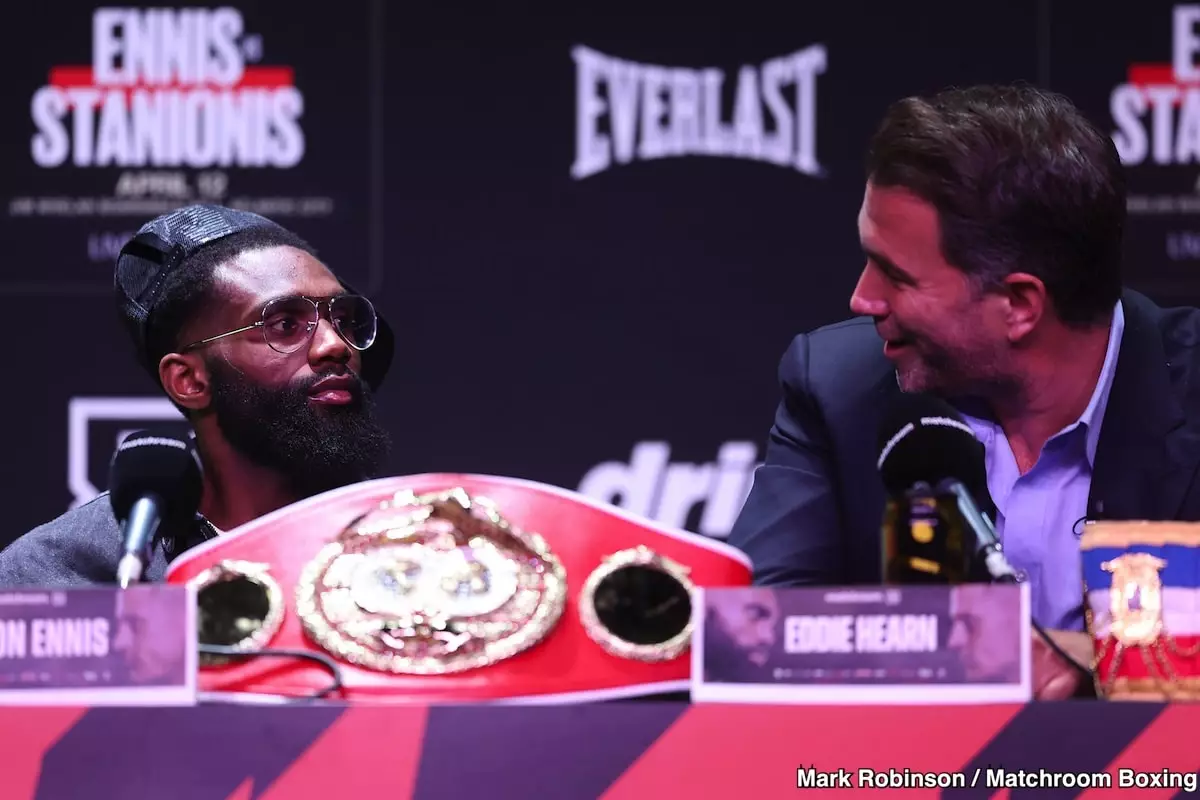In the high-stakes world of boxing, decisions often come laden with repercussions. For Jaron ‘Boots’ Ennis, the undefeated fighter with an impressive record of 33-0 and 29 knockouts, the recent controversy regarding a potential matchup with Vergil Ortiz Jr. has thrust him into the spotlight, albeit under less-than-favorable circumstances. Ennis finds himself at a crossroads, balancing ambition against a torrent of criticism from fans and pundits alike. His choice to pursue a bout against Eimantas Stanionis over Ortiz Jr. has raised eyebrows, leading many to accuse him of ducking a formidable adversary in favor of a ‘safer’ option.
However, beneath the surface of this debate lies a complex narrative fueled by miscommunications and the challenges of navigating the boxing landscape. Ennis maintains that his decision was not an act of cowardice but rather a tactical choice rooted in personal career strategy. Despite his insistence that he didn’t shy away from confrontation, the perception among fans sometimes paints a different picture—one where fear of tarnishing an unblemished record translates to avoiding competition.
Context Matters: The Stakes of Boxing
When examining Ennis’s situation, it’s crucial to consider the landscape of professional boxing as a whole. The sport is rife with razor-sharp competition, especially in the welterweight division. Vergil Ortiz Jr., who is emerging as a powerhouse with an intimidating reputation, embodies the very essence of a potential career-defining fight. Failing to engage with a fighter like Ortiz raises legitimate questions about a boxer’s willingness to take risks, fundamentally challenging the essence of what it means to be a champion.
Critics often point to financial incentives as a driving force behind a fighter’s choices, and in this case, a reported $8 million payday for facing Ortiz certainly adds extra weight to the argument. It is easy to dismiss Ennis’s choice as fear-driven when such lucrative opportunities are on the table. However, to wholly reduce the complexities of the situation to mere financial calculus woefully simplifies the dilemmas faced by modern fighters.
Ennis’s Response: Cry of the Understood
“We’re not ducking anyone,” Ennis counters emphatically, voicing his frustration over the misconceptions surrounding his decision-making. In an industry where public perception can shape careers, it is remarkable how podcasters and media personalities can sway opinions based on limited understanding. Ennis’s remarks reveal an athlete who is acutely aware of the noise surrounding his career yet steadfast in focusing on what he deems critical at this stage. “I’m focused on Stanionis,” he stated, encapsulating a mindset that emphasizes clarity amid overwhelming hearsay.
Eddie Hearn, Ennis’s promoter, has openly discussed the nuances of the decision, suggesting a reluctance on Ennis’s part to shift to the junior middleweight division—a logical career progression given the potential matchups available. However, it is a decision intimately tied to the broader strategic imperatives that every boxer faces: how best to protect their reputation, while simultaneously pursuing growth and legacy in a treacherous sport. In a world where every choice is scrutinized, walking that tightrope becomes increasingly challenging.
The Role of Fandom in Modern Boxing
Moreover, the very role of fans has evolved with the digital age. The rise of social media and independent commentary has empowered audiences with opinions that can quickly gain traction, often with little context. For Ennis, this has created not only a platform for spreading criticism but also a minefield of misinterpretation. The echo chamber that surrounds fighters today often perpetuates narratives detached from the reality of their circumstances.
As competitors like Ennis navigate these turbulent waters, the line between accountability and indecision blurs. Each decision comes with a multitude of opinions, some grounded in the sport’s heritage and others influenced by the sensationalist tendencies of online culture. Thus, Ennis’s criticism of fans, which at first glance appears dismissive, becomes a defensive stance against a backdrop of misunderstanding.
The legacy of any fighter is measured not only by their wins and losses but also by their capacity to navigate the myriad pressures that envelop their careers. Acknowledging the multifaceted nature of Ennis’s decision reveals a champion not merely concerned with maintaining an undefeated record, but with making choices he believes align with his career aspirations in one of the most volatile realms of professional sports.


Leave a Reply